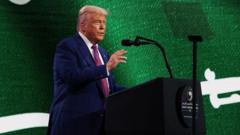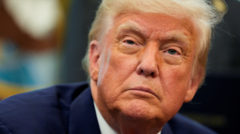In a significant shift in U.S. policy towards Israel, President Trump has rolled back sanctions imposed by the previous administration on numerous Israeli individuals and far-right settler groups accused of engaging in violence against Palestinians. The announcement came shortly after Trump took office and was made in light of heightened tensions in the Israeli-occupied West Bank, where Jewish extremists have reportedly targeted Palestinian villages, causing extensive property damage.
Trump Lifts Sanctions on Israeli Settlers Amid West Bank Tensions

Trump Lifts Sanctions on Israeli Settlers Amid West Bank Tensions
Following President Trump's inauguration, sanctions against Israeli settlers implicated in violence have been revoked, exacerbating tensions in the West Bank amidst ongoing unrest.
On January 20, 2025, Palestinian officials and the Israeli military reported incidents of violence, including arson against vehicles and homes in the village of Jinsafot. The Israeli military has also initiated counterterrorism operations in Jenin, a city in the northern West Bank that is known for militant activities.
The sanctions that Trump revoked were enacted by former President Biden less than a year ago and were aimed at curtailing violence attributed to settler groups. With the latest moves, far-right members of Israel's government and the Jewish settlement movement have gained traction, further entrenching their opposition to the recently established cease-fire in Gaza.
The cease-fire, which took effect on January 19, 2025, marked the first significant pause in hostilities since the escalation following the October 7, 2023, Hamas-led attack on Israel. The cease-fire calls for a six-week truce alongside planned exchanges of hostages—33 individuals currently held in Gaza will be swapped for hundreds of Palestinian prisoners—a detail some extremist factions in Israel vehemently oppose.
Critics of the sanctions' repeal assert that this decision is likely to provoke more violence in the already volatile region, potentially undermining peace efforts and exacerbating the suffering of civilians caught in the conflict.
The sanctions that Trump revoked were enacted by former President Biden less than a year ago and were aimed at curtailing violence attributed to settler groups. With the latest moves, far-right members of Israel's government and the Jewish settlement movement have gained traction, further entrenching their opposition to the recently established cease-fire in Gaza.
The cease-fire, which took effect on January 19, 2025, marked the first significant pause in hostilities since the escalation following the October 7, 2023, Hamas-led attack on Israel. The cease-fire calls for a six-week truce alongside planned exchanges of hostages—33 individuals currently held in Gaza will be swapped for hundreds of Palestinian prisoners—a detail some extremist factions in Israel vehemently oppose.
Critics of the sanctions' repeal assert that this decision is likely to provoke more violence in the already volatile region, potentially undermining peace efforts and exacerbating the suffering of civilians caught in the conflict.






















